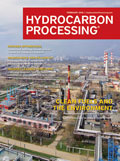
February 2016
Special Report: Clean Fuels and the Environment
In light of the current market dynamics, challenging the FCCU to move out of its “maximum gasoline” comfort zone is a winning strategy to drive overall refinery profitability.
Advancements in technology are delivering ever-increasing amounts of data that need to be processed and acted upon.
Determining which technology constitutes greenhouse gas (GHG) best available control technology (BACT) for a new or modified facility often hinges on the GHG BACT cost calculation.
Maintenance and Reliability
Overfilling storage tanks, especially those with large inventories of toxic or flammable material, has always been a safety concern for site owners and operators.
Outlook: Industry Leaders’ Viewpoints
Industry leaders and esteemed colleagues shared their viewpoints on 2016 and beyond with Hydrocarbon Processing.
Process Engineering and Optimization
Over the past decades, one engineering firm has been using discrete event simulation (DES) to study shipping and storage as an integral part of project execution throughout all phases of a process facility’s design, construction and operations.
A crude vacuum unit operating properly generates high gasoil yield vs. low-value vacuum residue.
Process Control/Instrumentation
This study shows the attributes and benefits of a data- and metrics-driven system focused on the process safety design integrity, reliability and control of process plant flares and pressure relief systems.
Improving profits and reducing costs remain priorities for owner/operators and management.
Columns
As the world continues to welcome more vehicles on the road, and as emerging economies invest in civil, industrial and energy projects, global fuels demand is forecast to increase through the end of the decade.
We recently received an update on the capabilities of a modern professional entity that combines metallurgical, structural and practical applied physics know-how in a US Gulf Coast location
Oil-rich Nigeria’s new presidential administration has announced several changes in the country’s oil sector, as it sets out to fulfill a pre-election campaign pledge by President Muhammadu Buhari to streamline the West African nation’s hydrocarbon industry.
Trends and Resources
US refiners are set to break the 10% “blend wall” for using ethanol in gasoline, but downstream professionals are certainly not happy about it.
New technologies are helping move refiners to a low-sulfur world, while revised fuel standards are catalysts for more clean fuels projects to develop higher-quality transport fuel.
US product markets weakened despite unseasonably strong gasoline demand, and the gasoil crack spread hit the lowest level seen in more than five years, under pressure from increasing supplies amid thin demand due to warmer winter weather.
At present, <i>Hydrocarbon Processing’s</i> Construction Boxscore Database is tracking over 2,100 projects around the world.
In a market with reduced capital investment budgets, revamps and upgrades are becoming increasingly prevalent to extend asset service life.
Smaller-scale gas-to-liquids (GTL) specialist Velocys Plc has named David Pummell as chief executive officer (CEO).

- SkyNRG starts construction on its first SAF plant in Delfzijl, the Netherlands 2/13
- India's Reliance wins U.S. license for Venezuelan oil 2/13
- Singapore light distillates stocks hit over 3-yr high on robust imports 2/13
- Three contractors injured at ExxonMobil facility in Beaumont, Texas (U.S.) 2/13
- China's epic renewables boom lifts it into rare clean capacity club 2/13
- TotalEnergies booked loss in France due to refining activities, CEO says 2/13




